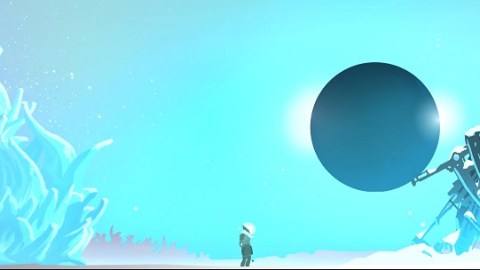How One Video Game Helped Me Overcome Writer’s Block

Confession: I’ve been trying to finish a screenplay for almost a year. I have an outlet for it, it can help my career — I’m just terrified it’ll be crap. So here I am, picking at the thing, crippling my prospects instead of making it happen. It’s Writer’s Block. And fear. And a big damn problem.
I think this video game might be my solution.
Elegy for a Dead World is a game we’ve written about but never played before. Created by indie developers Dejobaan Games, Elegy puts players in the position of an astronaut exploring three beautiful, abandoned worlds. All are colorful and rich, but desolate and broken. Their designs are inspired by three landmark poems: Ozymandius by Percy Shelley, When I Have Fears That I May Cease to Be by John Keats, and Darkness by Lord Byron. It is the astronaut’s – and player’s – job to investigate each world, catalogue the remains, and piece together the mysteries of each civilization by completing 27 writing challenges. The worlds are merely prompts for writing, and the goal of the game as Dejobaan sees is it is “everyone can write.”
So I gave it a shot.
“You begin on Shelley’s World, now devoid of life,” Dejobaan explains on the site. “A bloated, red sun scorches a landscape of towers, sculptures, and cryptic machinery.” Shelley’s World, the one based on Ozymandius, looks like this:
I know Ozymandius, but I remember nothing about burned skies and broken machinery in it. As I walked through an empty planet full of wreckage, the wreckage implied a story. That was a puzzle in need of a solution, as Dejobaan explains:
Each world offers multiple sets of prompts. Each intended to inspire you to write a different story about it. Elegy might ask you to write a short story about an individual’s final days, a song about resignation, or a poem about war… we like to think of those as puzzles — writing yourself out of a corner, so to speak.
The first prompt didn’t match up with the poem. Neither did any of the others. With no other clues to go by save what I saw, I wandered the desolation forced to stitch together an answer myself.
I started filling in the prompts. Small ones at first. Timidly. Blathering words out through my fingers as quickly as they popped into my head. They were silly. They were on the nose. They were crap. But they were writing, and they were helping me advance through the level.
As I did that, I found myself learning more about the world from the prompts and getting sucked in by the visuals. By the end of the first level, I was shocked by how the prompts guided the story I was writing. I went back through the level and amended my early answers, weaving newly learned information into the narrative I just discovered. Then I saved the whole thing and left, returning to float in the void of the main menu screen.
From there, I played my way through the other two worlds. The Keats world was colorful and bright, like a Bob Ross painting of a Miyazaki film. It’s prompts were more abstract and personal than the Shelley one, asking me to do things like write a letter back home and write a song. Truthfully, it took me a few passes to get comfortable with those prompts. They were more personal and required more reflection and vulnerability than I expected to put into this game. Writing those prompts was much harder than simply writing observations about the scenery, especially since the scenery was so cheery and the prompts were decidedly not. But they were a good stretch for my creative muscles, and jibed well with the screenplay I need to finish. I appreciated the challenge.
Byron’s world was the most complex, with four distinct locations and a more diverse set of prompts. I settled for one that prompted me to add to the poem, since I don’t know it. This prompt was the most sparse of any I tried, and I enjoyed the freedom to write what I wanted. I felt like I’d hit my creative groove and enjoyed my time creating a story.
By the time I’d gotten to the end, I was sad I was finished. So I went and played through the worlds again with different prompts. Now that I’d found my groove and trusted my writing abilities again, it was a joy — and that is the great secret of this game. Elegy does everything it can to inspire you. The visuals are abstract. The soundtrack is ambient, with very few musical cues (if any). Playing the game, they only appeared in key moments of each world’s story — at least, I think they were key moments. I was making up the story, after all; I assume all important plot points are scored by musical cues. The sound effects are also minimal, including the astronaut’s breathing. It gets heavy and loud at certain points in the game and that freaked me out. I never expected it and could not figure out what caused it. But, again, the sound told me that this was an important plot point, so I wrote accordingly.
As you finish each level, you publish your story. You can read others, and even share yours with other players. It’s a great way to build engagement with the gaming community, and helped me feel immediately better about my writing because I saw that I was part of a whole community doing the same thing. That took the loneliness out of creating something on my own, and made me feel like part of something special.
The developers will even let you screenshot your stories and print them out as a physical full-color book if you want to. I might. I found myself staring at the designs, wishing that my screen was bigger and the resolution was higher so I could see more of them.
And yes: it did help me face my screenplay fears and write more of it. I even made up an extra silly story for no reason that got drafted into a potential children’s book. Elegy ended up being a fantastic tool for warming up my writing muscles and helping me trust my own instincts again. I’ll definitely play it again… and who knows what the story will be?
Elegy for a Dead World is available for $7.49 on Steam for Windows, Mac and Linux.





